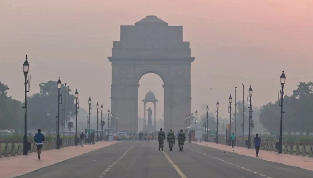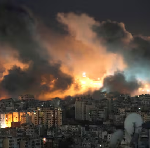As the air quality deteriorates in Delhi with Air Quality Index (AQI) remaining ‘very poor’ in the last one week. Delhi is predicted to face more challenges in coming days. This year, even before the beginning of Diwali festivities, Delhi has recorded worsened AQI crossing 300 mark. GRAP I and GRAP II have already been implemented in the national capital. A layer of smog has begun to engulf as the weather transition is underway. Toxic foam is seen floating on river Yamuna highlighting the pollution level in the city.
AQI in Delhi began to dip after Dussehra and has not improved since them. GRAP I was implemented on October 5 and GRAP II is on effect from 22nd October morning.
GRAP II Imposed in Delhi
Speaking to ANI, Delhi Environment Minister, Gopal Rai said that GRAP II rules have been implemented in Delhi as AQI crossed 300. He informed that five new initiatives have been introduced in GRAP-II. He said that Diesel generators will be regulated, frequency of metros and buses will be increased, parking costs will be increased so that people don’t use their cars for commute. Rai added, “The aim is to further reduce dust and vehicular pollution… We have called a meeting of all senior officials to deliberate on how to better implement the GRAP-II rules in Delhi NCR.”
Prediction For GRAP III
Seeing the existing conditions, it is predicted that the situation can worsen more after Diwali in Delhi. In such circumstances, the Delhi government might go ahead with implementation of GRAP III.
Last year, on 29th October, revised Graded Response Action Plan (GRAP) III was implemented in Delhi. GRAP III is usually brought into effect when the air quality reaches to ‘severe’ category which means AQI between 401 and 450. AQI in Delhi always crosses 400 mark after Diwali causing problems to people.
GRAP III enforces strict ban on construction and demolition activities in the entire NCR, except for the categories which include Railway services, Railway stations, Metro Rail Services including stations, Airports, ISBTs, National security or defence related activities, Hospitals/health care facilities. Dust generating or air pollution causing C&D activities are strictly banned. Earthwork for excavation and filling including boring & drilling works are also included in this ban. Industries and operations not running on fuels as in the standard list of approved fuels for NCR are banned. All structural construction works including fabrication and welding operations are banned. Frequent mechanised road sweeping and daily water sprinkling along with dust suppressants, before peak traffic hours, on roads is carried under this response action plan. Mining and stone-crushing activities is completely banned. However, for the construction projects, non-polluting or non-dust generating activities such as plumbing works, interior decoration, electrical works and carpentry related works are permitted.
In November 2023, Delhi’s AQI had peaked 400 and exceeded beyond that.



